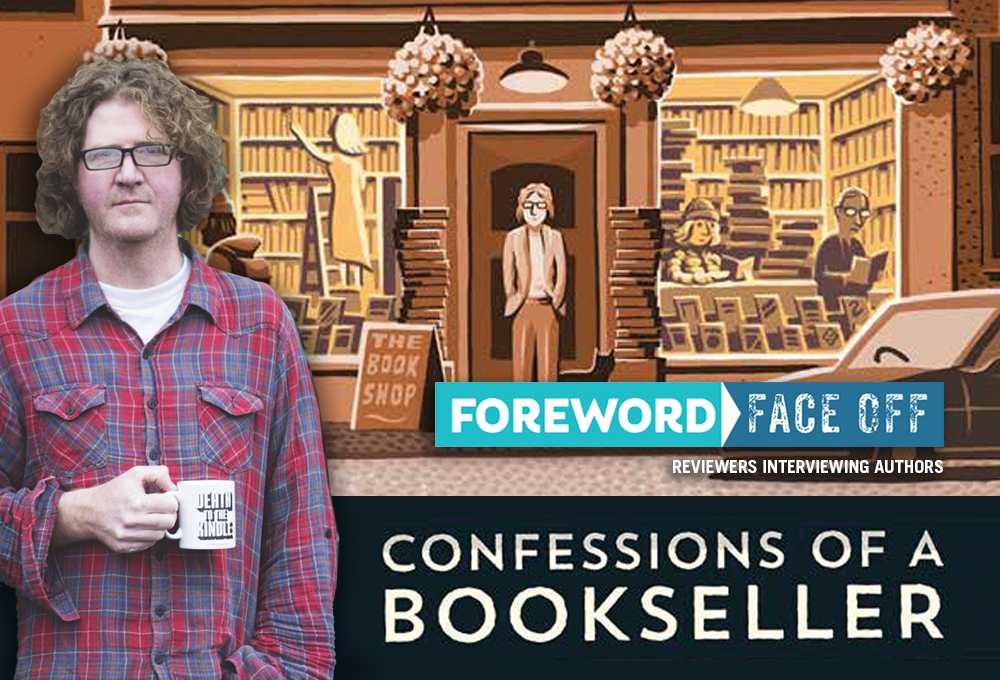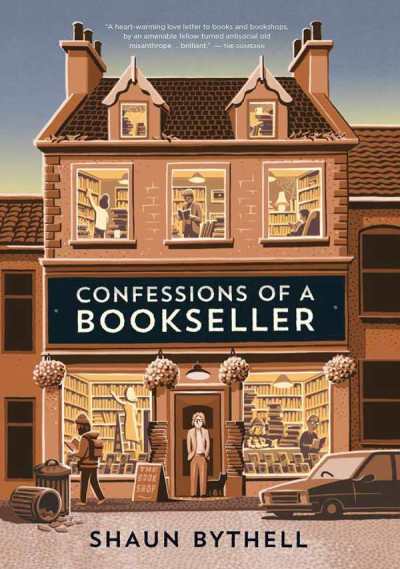Foreword This Week: Reviewer Michelle Anne Schingler Interviews Shaun Bythell, Author of Confessions of a Bookseller

Meet Shaun Bythell, owner of Scotland’s largest secondhand bookstore, in the wee little seaside village of Wigtown. Right out of central casting, The Bookshop resides in an old stone townhouse with fireplaces ablazing, a shop cat prowling, and 100,000 books lining a maze of hallways and corridors—and Shaun’s surliness and cutting wit is almost too perfect to be true. Who would have thought that a guy who can barely tolerate conversation with his customers could be successful in retail?
Confessions of a Bookseller is Shaun’s gift to all of us wannabe bookstore owners. Yet, even while 
we envy his position, in the journal-like entries we also experience his daily hassles and concerns.
A sucker for books about books from cantankerous writers, managing editor Michelle plucked a copy of Confessions from the mail bins and wrote a delightful review for the March/April issue of Foreword Reviews. She pitched this interview so we chased down Shaun through his US publisher, David R. Godine.
Michelle, you’re on.
How did you get into the secondhand book business, and why, despite all of the challenges enumerated in Confessions, do you stay?
I became a bookseller by accident, really. I had never intended to, but I was visiting my parents at Christmas and dropped into the bookshop—as I always did—to say hello to John, the previous owner and buy some books. I’d known John for years, and we got talking about things. I explained that I was doing some temporary work in Bristol and that my life lacked direction. He told me that he was retiring and that I should buy his shop. It was the best decision I’ve ever made. I had no money, but back then the banks were keen to lend it, so I borrowed enough to buy the shop. I’m still paying it back, but I have no regrets.
You’ve had to get creative with new revenue streams since online stores remade the book business. What adaptation, product, or service has worked out best for you?
After the credit crunch of 2008 and the inexorable rise of Amazon, bookselling has become a pretty difficult business financially. I set up The Random Book Club as a mail order service where subscribers receive a book a month but they have no control over what they get—it’s up to me. It has been a huge success. My biggest mistake was making it too cheap. If I was doing it again I would make it more expensive and have fewer subscribers with the same income, and more profit.
Amazon is undoubtedly the villain of your book, but its pull and convenience are hard to resist. What do you recommend that readers do to break themselves of the terrible habit of Amazon-buying?
Amazon has a monopoly on voracious consumerism. It’s quite easy to quit—I now only buy a couple of things from Amazon a year, and then only because I can’t find them anywhere else, and I live in a remote part of rural Scotland. I needed a part for my chainsaw recently and, although it would probably have been easier to buy it from Amazon, I waited until I was buying books in Stranraer, about twenty miles away, and got it from a shop there. OK, I had to wait a few days longer than if I’d bought it online, but I didn’t have to make an extra journey, and I supported a local business. That is worth far more to me than the instant gratification of buying online. And I take great pleasure in not making the world’s wealthiest man any richer.
What is the most frequent, or most irksome, misconception that you encounter regarding your business?
Easy—when people assume that we get our books for free.
In the course of your book, you reveal a minor fascination with bookplates. Why do you appreciate them so much?
I love bookplates because they make a mass-produced item different. They add another dimension to the book’s history. Much as I love books, there’s no denying that they are mass produced, and every copy of my book, for example, looks the same as any other. Add a bookplate and you open up a new world. You know the name of the book’s owner, and wonder who they were, who the artist was, what was their life like, and what does the illustration tell you about the person who commissioned it?
How did your regular customers respond to their portrayals in Confessions of a Bookseller, if at all? How did Granny, Nicky, and Flo take their portrayals?
Most customers probably haven’t read it so don’t know. The only one who wasn’t happy with his portrayal was Bum Bag Dave, but even he has started coming back to the shop again. Nicky’s a little bit annoyed with me because she didn’t have a chance to read it before it was published. Granny is delighted, but also annoyed with me because she doesn’t think that she features enough. Flo—to the best of my knowledge—hasn’t read it.
In your years of running The Bookshop, which special volumes from incoming boxes stand out in your memory?
The book I loved most for its beauty was Thornton’s Temple of Flora. It is outstandingly beautiful. For titles, I think it’s hard to beat Cooking with Semen.
Your bookstore is near one of Donald Trump’s golf resorts, and your entries show that you were privy to rumblings of his candidacy before Americans took that scenario seriously. To what do you attribute your prescient insights: bookseller omniscience? Bad local experiences? Other? And if we could be so bold as to beg a second glance into that crystal ball, seeking better wisdom this round, what are your predictions for 2020?
You credit me with far more prescience than I deserve. The Trump call was made by my friend Colin, who has correctly predicted the outcomes of every election and referendum for the last ten years. I have no idea how he does it, but he has yet to fail. I suppose that working in a bookshop you tend to have a lot of conversations with a lot of people, so you begin to acquire a sense of public opinion which politicians, in their ivory towers, do not. As for predicting 2020, with Brexit, Coronavirus, and global warming, I would challenge even the most confident of clairvoyants to dare to guess what lies ahead. What I hope for the future is that Scotland will become independent and rejoin the EU, and that the American electorate will vote Trump out of office by a massive majority. Now that I’ve said that, neither of those things will happen.
A question that I’m sure every bookseller loves: what are you reading now?
I’m currently reading The Goldfinch, by Donna Tartt. It is brilliantly gripping and—like The Secret History—beautifully written. She is a writer whose work will stand the test of time.
Michelle Anne Schingler
